2024 Projects
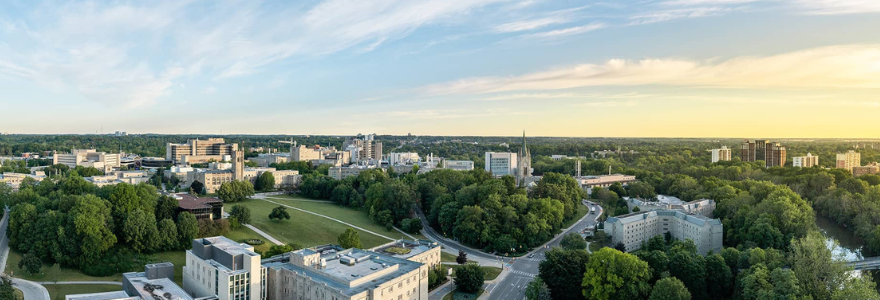
2024 Western Sustainable Impact Fund Projects
Culture Nights at the Lodge
The Wampum Learning lodge hosts bi-weekly Culture Nights, that are designed to bring people together in a healthy way, which is very important in building a safe environment for cultural reclamation. This project has introduced new programming in two areas, Indigenous crafting and Powwow Fitness.
CEMS Global Citizenship Seminar
The annual CEMS Global Citizenship seminar focuses on the impact of leaders and businesses on sustainability. The 2024 seminar centered on the fashion industry and the sustainability challenges and opportunities within its supply chain. During the seminar, students researched the common fibers used textile production and its impact on the planet. Further to this, they proposed business models that could bolster textile circularity in the industry.
This year’s GCS was run by Dr. Nadine De Gannes, a faculty member in Accounting and Sustainability. Students were prompted to consider national and regional regulations (greenwashing), and changing sourcing, design, production and consumption choices. This included sustainable and circular textiles, human rights and fast fashion brands, the rise of the clothing rental market, and future steps in pursuit of textile circularity.
Students had the opportunity to visit the shredding/recycling plant here in London Ontario in January. During this visit, students learned more about the process that clothing donations and textiles take from initial donation, through retails stores, the shredding/recycling/repurposing, or sending textiles abroad. They also had the opportunity to learn of the multiple lines of work that Goodwill engages in, including Edgar & Joes Café.
Western Engineering Technology Club - DACC Device
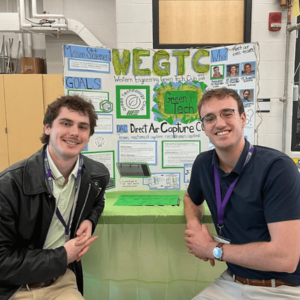 The Direct Air Carbon Capture (DACC) project was first focused on building a device which could remove carbon dioxide from the atmosphere using a 3D printed solid sorbent material with the hopes of becoming more efficient than existing DACC devices. Initial objectives included building a functioning device and testing a variety of different sorbent structure shapes. This project was led by a student team of 22 who were able to gain hands-on experience to improve their learning.
The Direct Air Carbon Capture (DACC) project was first focused on building a device which could remove carbon dioxide from the atmosphere using a 3D printed solid sorbent material with the hopes of becoming more efficient than existing DACC devices. Initial objectives included building a functioning device and testing a variety of different sorbent structure shapes. This project was led by a student team of 22 who were able to gain hands-on experience to improve their learning.
In the team's first year a functioning prototype was created and the team was selected as a finalist for the Carbon Removal Challenge. This led the team to present in front of industry experts at the Carbon Unbound Conference in New York City.
In the second year the team added a New Venture Project business group through the Ivey Business School. The team also sponsored two engineering capstone groups to continue the development of the prototype. This work resulted in another finalist selection at the Open Air Carbon Removal Challenge which the team attended in May 2025.
Western Engineering - Sustainable Impact - Faculty Education Session
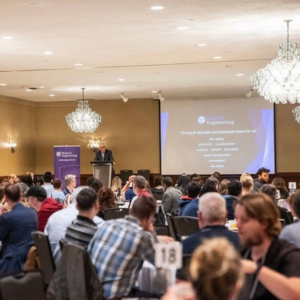 This project was led by Laurie Lockington-Wong, lead for Western Engineering's Strategic Plan Implementation, organized a Speaker Session for the Faculty of Engineering, focused on sharing how Western researchers are making a positive impact on life and the environment. Through this speaker series 140 attendees were engaged, including students, staff, and faculty.
This project was led by Laurie Lockington-Wong, lead for Western Engineering's Strategic Plan Implementation, organized a Speaker Session for the Faculty of Engineering, focused on sharing how Western researchers are making a positive impact on life and the environment. Through this speaker series 140 attendees were engaged, including students, staff, and faculty.
Attendees were organized into diverse groups (to help encourage new connections) and discussion was facilitated to drive engagement. The collected feedback demonstrated an overwhelmingly positive response and enhanced the culture of sustainability both within the Faculty of Engineering. This will also have an impact on how Western Engineering drives sustainability in the world.
This project received strong support from leadership; Dean of Engineering (Ken Coley) and the Associate Dean of Research (Miriam Capretz).
SustainableCities Connect Workshop
This project was led by graduate student, Junyu Ke. She successfully executed a workshop series that provided a vital platform for dialogue and partnership among Western administrators, the ICCCASU representative, and local and international leaders in environmental and sustainability fields. These discussions were captured in a documentary film that not only recorded the final events but also the rich dialogues and reflections of participants throughout the collaborative process. This visual documentation served as both a feedback mechanism and a historical record, enhancing the project’s outcome as a knowledge exchange strategy and aligning with the project's initial goals.
The project also developed a creative exhibition held at the Artlab Gallery from November 14 to December 5. This exhibition fostered an interdisciplinary dialogue by bringing together artists, scientists, and engineers to explore the intersections of art, urbanization, and sustainability. It featured innovative displays such as solar-powered artworks, mineral paintings, projections, performances, and 3D-printed sculptures, pushing the boundaries of traditional academic research andemphasizing. View photographs from the exhibit here.
Evaluating and sustaining biodiversity at Western's Experimental Field Station
The Environmental Sciences Western (ESW) field station is a 35-hectare core research facility located just 15 minutes north of Western University’s main campus in London, Ontario. Featuring a diverse mix of natural wooded areas, open fields, and agricultural lands, the ESW is uniquely positioned as one of the few university-affiliated field stations of its size in Canada. It offers exceptional opportunities for biodiversity research, student training, and community outreach in conservation science.
This project, supported by WSIF funding, aimed to:
1. Conduct a comprehensive biodiversity inventory of plants, insects, birds, and mammals;
2. Develop a sustainable management plan to maintain and enhance biodiversity;
3. Evaluate the use of the site by migratory and resident birds through bird banding and telemetry tracking.
Key achievements include the establishment of a bird banding station, which successfully collected data on 343 birds during the fall 2024 migration season. This initiative provided hands-on training to Western graduate students, supported multiple research projects in Biology and Psychology, and engaged the academic community. Additionally, an automated radio telemetry station was installed as part of the international Motus Wildlife Tracking System, further enhancing the site’s research capabilities.
The project laid a strong foundation for continued development and has inspired a follow-up WSIF project under the newly established Centre for Animals on the Move (CAM). This initiative honors Dr. Keith Hobson’s legacy while establishing a sustainable, high-impact platform for research, education, and public engagement in wildlife ecology.
Digitizing Biology's Collections Reveals Biodiversity Data From London and the Western Campus
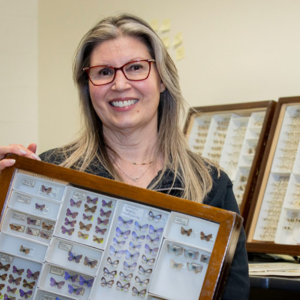 The Dr. Laurie L Consaul Herbarium and the Zoological Collections of the Department of Biology contain thousands of research specimens of plants, fungi and animals collected on campus, throughout the city of London and in the surrounding region. This project, led by Dr. Nina Zitani, began digitizing the thousands of speciments in the Collections, focusing on two families of animals (Metazoe) and one family of plant that included specimens located locally.
The Dr. Laurie L Consaul Herbarium and the Zoological Collections of the Department of Biology contain thousands of research specimens of plants, fungi and animals collected on campus, throughout the city of London and in the surrounding region. This project, led by Dr. Nina Zitani, began digitizing the thousands of speciments in the Collections, focusing on two families of animals (Metazoe) and one family of plant that included specimens located locally.
A project site on iNaturalist titled “Biodiversity Collections at Western Biology” was created. The images and data of 723 specimens (683 bees; 40 orchids) and 67 species (54bees; 13 orchids) were uploaded as observations. The iNaturalist project site has made biodiversity data on orchids and bees available to the Western campus community, and scientists and citizen scientists around the world. It will greatly increase the awareness of this incredible interdisciplinary resource across campus.
The Collections now have research grade equipment,established procedures and protocols that will be used for many years into the future, to continue digitization. Dr. Zitani will be training new team members to continue the digitization process, providing invaluable research experience to Western students.
Alternative analysis of winter road salts
This project was led by Robert Addai, PhD Candidate (Chemistry) and supervised by Dr. Yolanda Hedberg, involved the research and implementation of alternative de-icers, that are less corrosive and harmful to the environment. By working together to find more sustainable solutions, the University can contribute to the broader community's efforts to reduce the environmental impact of road salt use.
The study highlighted the contrasting effects of de-icing agents on materials, with inorganic salts being more aggressive towards metals and organic salts having agreater impact on concrete infrastructure. These insights provide a foundation for optimizing road salt selection based on specific application needs, balancing corrosivity and environmental impact.
Owl habitat as natural rodent pest control
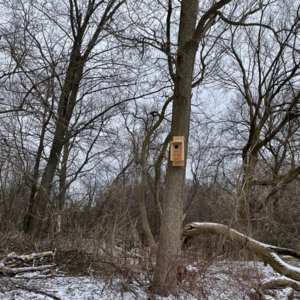 This project was led by Dr. Brendon Samuels in collaboration with Landscape Services. Ten boxes for birds of prey (such as Easter Screech Owls, Barred Owls, Great Horned Owls or American Kestrels) were installed in natural areas near buildings on campus, providing a natural rodent pest control service. Each bird of prey will consume hundreds to thousands of rodents each year, which will reduce the risk of rodents entering building and requiring other interventions, such as applications of pesticides.
This project was led by Dr. Brendon Samuels in collaboration with Landscape Services. Ten boxes for birds of prey (such as Easter Screech Owls, Barred Owls, Great Horned Owls or American Kestrels) were installed in natural areas near buildings on campus, providing a natural rodent pest control service. Each bird of prey will consume hundreds to thousands of rodents each year, which will reduce the risk of rodents entering building and requiring other interventions, such as applications of pesticides.
This project has led to positive community education about responsible pest management and reducing environmental impacts of pesticides.
Forest City Tree Festival
This project was led by Dr. Brendon Samuels. He developed and implemented Western's first-ever Forest City Tree Festival in October 2024. The weekend was dedicated to celebrating trees on campus, in collaboration with City of London, ReForest London, and the Upper Thames River Conservation Authority. Programming including nature walks, tree giveaways, and panel discussions.
Guest speakers and panel discussions, and outdoor public event, guided hikes and an Indigenous-led native plant gardening workshop. The project also distributed fruit trees in partnership with the City of London to community members at Oneida Nation of the Thames to promote food security. The event was highly successful at drawing turnout from various community partners (relevant nonprofit, grassroots and industry groups) and the outcomes of the event aligned with the project's objectives.
Bird Safety Window Films for Music Building
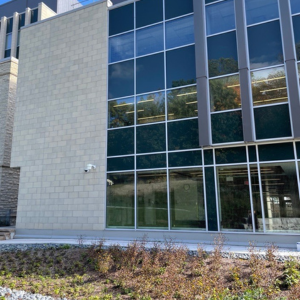 This project was led by campus community members with the Faculty of Music in collaboration with Western Facilities Management. They coordinated installation of bird safety film on the windows of the entrance corner of the Music Building as well as two connecting passages between it and Talbot College that are almost entirely made of glass.
This project was led by campus community members with the Faculty of Music in collaboration with Western Facilities Management. They coordinated installation of bird safety film on the windows of the entrance corner of the Music Building as well as two connecting passages between it and Talbot College that are almost entirely made of glass.
This film application supports Western’s goals to live in harmony with the land and to protect the natural systems. The film is a visible sign of the university's commitment to protecting wildlife and biodiversity.
Ecologies in Practice; podcast and workshop series
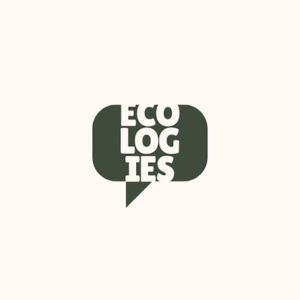 This project has launched public podcast and workshop series at the Centre for Sustainable Curating. The podcast 16-episode series focuses on artists and their work as it relates to the environment and explores environmental issues and climate change from a cultural and artistic perspective. Listen to the podcast series here.
This project has launched public podcast and workshop series at the Centre for Sustainable Curating. The podcast 16-episode series focuses on artists and their work as it relates to the environment and explores environmental issues and climate change from a cultural and artistic perspective. Listen to the podcast series here.
An in-person workshop explored sustainable practices, processes, and materials of art-making. Together, the podcast and workshops will engage the campus and local communities, while supporting teaching and learning with sustainability knowledge and practices.
Tahir Carl Karmali: Curatorial Tour and Talk
In collaboration with the Centre for Sustainable Curating, this project developed a hands-on workshop for Western students with Tahir Carl Karmali, a Nairobi-born and Brooklyn-based artist, as the event's featured guest.
He works across photography, installation, papermaking, sculpture, and sound and concentrates thematically on migration, landscape, geology, labor, and belonging. Planned to coincide with the display of his artwork at the nearby Kitchener-Waterloo Art Gallery in the exhibition 'Erratic Behaviour', curated by Western PhD candidate Katie Lawson. His series Strata (2017-2019) consists of eight textile sculptures. Each work takes on different forms and styles of sculpture all using dyed raffia stained with cobalt. To create the dye, Karmali performs a ‘reverse mining’ practice whereby old American cell phone batteries—bought one Bay—aredismantled to extract the copper, cobalt oxide, and aluminum.
The Department of Visual Arts hosted Karmali for a public lecture, followed by a conversation with Lawson. This well attended event offered an exceptional opportunity to engage with the artist about his research and material experimentation, facilitating interdisciplinary dialogues about extractive industries, colonialism, contemporary art and climate change.
terra aesthetica: art, activism, and the tectonics of power and pedagogy
This project was led by the Department of Visual Arts and hosted a panel on art, activism, educational methodologies, and power structures with perspectives from experts in art and visual culture in March 2024 for the campus community. The interactive panel discussion involved experts in environmental activism and scholars in the fields of art and visual culture, featuring artists Gwenyth Chao and Emily Chudnovsky.
The primary objective of the panel was to facilitate an in-depth exploration of how artistic expressions intersected with and influenced activist movements, powerdynamics, and educational practices. It provided a platform for critical discourse on these synergies, particularly in recognizing and understanding theAnthropocene era as exemplified by the "meromictic" exhibition.
"Meromictic" offered a profound exploration of the Anthropocene, marked by human influence on Earth's geology and ecosystems. The exhibition featured worksby Janice Brandt, Greg Curnoe, Simon Fuh, Stefan Herda, Lisa Hirmer, Tomonari Nishikawa, Nico Williams, and Kelly Wood, delving into the complexities of this erathrough the lens of stratigraphy. The panel extended this inquiry, examining the role of art and activism in shaping and responding to our understanding of theAnthropocene and considering how power dynamics and pedagogical approaches influenced our perception and response to this critical era.
Migratory fish in Medway Creek: eDNA validation of temporal and spatial patterns
This research project led by Dr. Yolanda Morbey, Dr. Tim Hain, and Dr. Bryan Neff examined white sucker migration in Medway Creek, and involves field lab and outreach components. White suckers are a migratory fish, who migrate approximately 250 km up river from Lake St. Clair to spawn in the upper Thames River and its tributaries, and back again. This research focused on the white sucker could provide key information about the overall ecosystem health of the Thames River.
This on-campus project was able to identify the species of fish that migrate and spawn in Medway Creek. Most are likely shorthead redhorse (Moxostomamacrolepidotum), with fewer numbers of golden redhorse (M. erythrurum), and silver redhorse (M. anisurum). These species can only be identified in the hand, and thus electrofishing was a critical element of our study. The absence of white suckers during the study period was also confirmed.
This project also provided high quality training for one M.Sc. student and two undergraduate students in the methods of fish capture and fish identification. Excellent training in laboratory methods for the preparation of eDNA samples were also provided to an undergraduate student and served as a great learning opportunity.
WaterAid Western's Annual Sustainability Conference
The annual WaterAid Western Sustainability Conference took place at the end of the academic term in March 2024, around World Water Day. This student-led event focused on the climate crisis, call for action, and educate students on how to live a more eco-conscious lifestyle.
The conference aimed to advance Western’s sustainability efforts through extensive community engagement, providing valuable insights to both well-informedattendees and those new to the subject. The initiative placed a strong emphasis on inclusive information sharing, particularly highlighting indigenous stories and experiences. The annual conference works to promote community building amongst other campus sustainability clubs, and also works as a way to form future partnerships in order for WaterAid Western to make more impactful change on campus.
This year’s theme, “Powering a Sustainable Tomorrow,” focused on engaging students in sustainability efforts both on and off campus. The conference addressedclimate anxiety, local initiatives to join and potential lifestyle changes, equipping attendees with the tools needed to contribute to positive change and adopt sustainable practices.
Key achievements of the conference included presentations by speakers Jessica Cordes and Dr. Katrina Eyvindson, followed by a panel discussion that encouraged activeparticipant engagement. Workshops were led by EnviroUSC, the EnviSci Association, the Western Sustainable Leaders Program. The conference also worked with Ivey SIC as a workshop lead too. All workshops were thought provoking and took very different approaches to becoming more sustainable day to day. From nature walks, to debates from prescribed differing perspectives, there was a lot to offer participants of the event.
Bird-friendly retrofitting for Collip and Western Science Centre windows
This project was a collaboration between the Department of Biology and Western Facilities Management. Bird safety film was installed on the windows of the Collip Medical Science Building, glass façade of the Western Science Building, and windows of third-floor bridge connecting BGSB to curb bird strikes.
Recyclable Polymer Foam Composite for a Sustainable Future
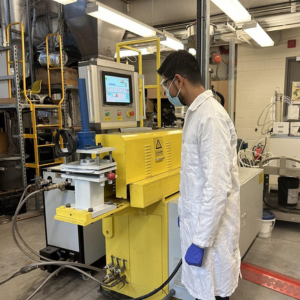 This project, led by Apurv Gaidhani with the Faculty of Engineering, examined the effect of CO2 on the exfoliation of carbon and on the thermal, sound insulation, fire retardancy, and mechanical properties of polystyrene nanocomposite foam.
This project, led by Apurv Gaidhani with the Faculty of Engineering, examined the effect of CO2 on the exfoliation of carbon and on the thermal, sound insulation, fire retardancy, and mechanical properties of polystyrene nanocomposite foam.
This project was in collaboration with a start-up company, ShivGreen Foam Insulations, which focuses to capture this market opportunity by developing a sustainable,eco-friendly, recyclable and high-performance extruded PS foam. The interaction of CO2 with the carbon fillers to promote their dispersion in the polymer matrix,and thereby improve the performance, had not been studied. In collaboration with ShivGreen Foam Insulations, this project aimed to compare the role of graphene nanoplatelets, graphite and renewable carbon sources such as biochar to produce polystyrene composite foams using supercritical CO2 via extrusion foaming.
Digital dentistry workflows to improve sustainability and accessibility
This project was led by Dr. Les Kalman through Schulich Dentistry. This project entailed the acquisition and utilization of two digital patient scanners. These scanners provide detailed, digital, three-dimensionalimages of patient’s teeth. The scanners and associated peripherals (laptops, computer carts, etc.) can be used to develop an open digital (non-analogue) workflow for the fabrication of dental prostheses and delivery of treatment. Currently, the dental school is completely analogue, shipping conventional dental impressions and casts to the lab through vehicular transport, and then delivery of the completed prosthesis back to the dental school. In fact, the analogue workflow may need multiple trips back and forth from the laboratory and school.
A digital workflow permits an updated avenue for teaching and learning, improved efficiency, significantly reduced carbon footprint and improved accessibility for patients. This project will enable future dental students to provide the highest level of patient care, through a sustainable approach, and the opportunity to include these sustainable workflows in courses and research.
LEADER Project Workshop/Fundraiser
This project hosted two events focusing on fundraising/entrepreneur education workshops for not-for-profit and social enterprises, and is a collaboration between LEADER Project at Ivey and Innovation Works. The goal and objective was to educate social enterprise leaders with business acumen, in order to help make these organizations more sustainable. These events targetted enterprises that inherently benefitted the community to create and foster community ties and connections.
Educational Signs for the Pollinator Garden
This project installed three informational signs at the Friends of the Garden (FOGs) Pollinator Garden, with artwork created by Clair Yu. The Pollinator Garden was created in 2022 and expanded in 2023 and is a significant and visible sustainability project on campus. This signage will improve awareness of the project and to teach the campus community about the design elements and goals of the pollinator garden.
The first sign provides an introduction to FOGs and the PG and provides information about how native plant species act as host plants that are necessary for thelife cycles of pollinators and increase biodiversity. The second sign provides information on native bees species and the nesting habitats and conditions needed to allow them to complete their life cycles. The final sign provides information on how insects survive the winter using plant materials, and explains why FOGs keeps plant stalks from the Fall to Spring in thegarden and the importance of these stalks for insect survival. Additionally, the sign suggests positive actions that members of the public can take to support insects in the own garden during each season of the year. Lastly, after the installation of the sign, a survey was distributed to collect feedback and spread awareness of the new signage.
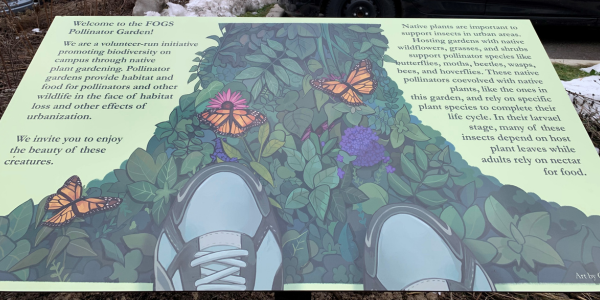
Usage of Recycled Rubber in Light Weight Concrete Applications
The Western Engineering Concrete Canoe Association (WECCA) sought out to reduce the environmental impact of the concrete mix used in this year’s project through the introduction of recycled rubber tires. This project was a great opportunity for the club to expand their knowledge about how recycled material can be used as a direct substitute for unsustainable aggregates. By implementing rubber into the concrete mix design, the team successfully was able to decrease the consumption of unsustainable aggregates and increase theconcrete’s tensile strength.
Western University Sustainable Transportation Pitch Competition
This project hosted on-campus event targeted towards first and second year undergraduate engineering students. The pitch competition allowed students to think about the modes of transportation available on campus, in addition to accessibility and functionality of existing infrastructure to come up with aproposal on how they would improve/re-design their proposed site on campus. By offering an event that did not have technical knowledge requirements, students were able to understand the true viability of developing sustainable solutions that they can implement in the spaces they use every day. Transportation is for everybody, and this event provided a breadth of opportunity to get students thinking about transportation from an opportunistic perspective.
Planetary Health Considerations in Human Health Education: PPE Recycling Pilot Project in the Schulich School of Medicine and Dentistry Anatomy Lab
This project implemented a PPE recycling program in the Clinical Anatomy Lab at the Schulich School of Medicine and Dentistry, specifically focusing on disposable face masks. The first boxes were set up in May 2024, and have filled and shipped 10 boxes, equating to approximately 15,000 to 20,000 masks.
Snack Wrapper Recycling Program
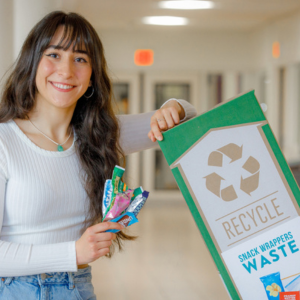 This project built upon and expanded a program started by the Society of Biology Graduate Students (SOGBS), that recycles snack wrappers in the Department of Biology. It expanded the program to add snack wrapper recycling at 9 locations on campus including BGSB, Middlesex College, UCC, WSC, NCB, Collip and NSC and will continue to be managed by the SOGBS.
This project built upon and expanded a program started by the Society of Biology Graduate Students (SOGBS), that recycles snack wrappers in the Department of Biology. It expanded the program to add snack wrapper recycling at 9 locations on campus including BGSB, Middlesex College, UCC, WSC, NCB, Collip and NSC and will continue to be managed by the SOGBS.
Signage for Campus Trail Entrances
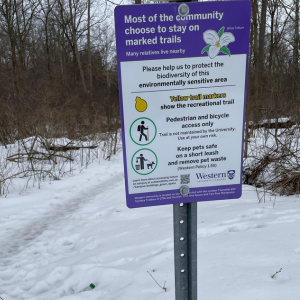 This project installed informational signage near the entrance to several trails on campus to inform trail users about their ecological significance, to share rules and considerations for using natural areas, and to reflect Western's commitment to environmental stewardship. Signs were installed at entrances to the Medway Valley Heritage Forest and at several locations along the Thames River.
This project installed informational signage near the entrance to several trails on campus to inform trail users about their ecological significance, to share rules and considerations for using natural areas, and to reflect Western's commitment to environmental stewardship. Signs were installed at entrances to the Medway Valley Heritage Forest and at several locations along the Thames River.
Promoting Sustainable Transportation Options to Campus - Cycling at Western
The overall goal of this project is to encourage active and sustainable transportation options on campus in order to increase participation in the bicycling community. From September to October 2024, Cycling Awareness Month at Western was a campus-wide cycling competition that encouraged participants to track their commutes via bicycle. The second element of this project will install a bike repair station on campus.

